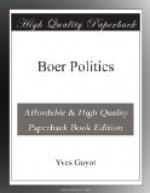5.—Methods of Exaction.
A reduction of L100,000 was made on the railway tariffs; but in July, 1897, the duties on corn and food-stuffs were increased by L200,000. At the end of 1898, a certain number of these were lessened, but not that on flour. A comparison of the list of duties between 1897 and the end of 1898 shows that they were increased on twenty-eight products, and decreased on four.
Coal travelling a distance of 25-1/2 miles, the charge made by the Netherlands Railway Co. is 4s. 5d., which is 8-1/2d. per ton per mile; while the Free State Railway only charges 5-3/4d. and the Natal line 3d.
The Company collects the customs dues for account of the State, as security for the payment of interest on their shares and debentures.
Dr. Kuyper is quite willing to admit that the “financial administration leaves something to be desired,” but he adds that, “while at the Cape the taxes on produce are at the rate of 15 per cent., in the Transvaal they are only 10 per cent.” But it is easy to see how, by means of railway tariffs and various combinations, due to the cunning of Mr. Krueger and his Hollander friends, it has been possible to enhance prices of every description.
CHAPTER XII.
“CAPITALIST INTRIGUES” AND THE WAR.[17]
1.—A War of Capitalists.
“It is a war of capitalists against a set of poor Boers who have no sort of interest in the dispute!” Such is the general cry.
Let us look at the facts.
The other day, anent the attempt upon the Prince of Wales, I referred to the anarchist and socialistic attacks of certain Pro-Boer and Anglophobe journals on capitalists, financiers, and the wealthy “metal-hearted mine-owners,” as Dr. Kuyper calls them. I reminded my readers that Professor Bryce himself treats as absurd the tale that the aim of the Jameson Raid, as stated by those papers, was the conquest of the Transvaal for Rhodesia. I shall now show by documentary evidence that the war did not break out through any action on the part of gold-mine proprietors. In the first place, the greater number of these proprietors reside in Europe; and as much in France, Germany and Belgium, as in England. Their representatives in the Transvaal may hold more or less important interests in those mines, but they are imbued with a full sense of their responsibilities.
Now, commercial men never seek to bring about a political crisis unnecessarily; they invariably endeavour to avoid one. If they resign themselves to such a course, it is only as a last resource.
The truth of these general assertions is verified in the case in point by two documents which have not been fabricated after the events.
They are the reports of the Chamber of Mines, published by Mr. Rouliot, in January 1898, and January 1899.[18]
[Footnote 17: Le Siecle, April 7th, 1900.]




